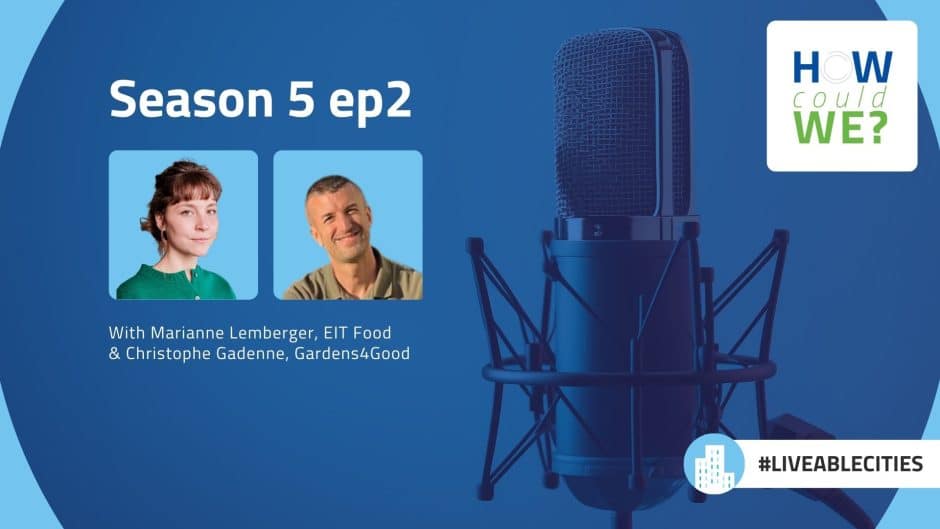How Could We? transform cities – Episode 2 with Marianne Lemberger and Christophe Gadenne

Climate KIC launches Season 5 of the “How Could We?” podcast, which explores cities’ transformation and why cities play such a key role in tackling climate change.
The How Could We? podcast explores solutions and nurtures hope for a climate-resilient, inclusive, and beautiful future for all. In each episode, we engage in deep conversations with people who are pioneering systemic change.
In this season, host Anne-Sophie Garrigou interviews experts about the importance of community engagement, how cities’ dialogue with industry can enact change and the collaboration of cities with other actors – highlighting the role of cities in demonstrating the transformation needed to achieve ambitious climate goals.
Meet our guests: Marianne Lemberger and Christophe Gadenne
In this episode about the importance of community engagement in cities’ transformation, our guests are Marianne Lemberger, Programme Manager from EIT Food & Christophe Gadenne from Gardens4Good.
[custom_script]
Marianne’s work at EIT Food focuses on creating a more sustainable, inclusive and healthier food system all around Europe. As Programme Manager, she is in charge of the work packages in the EIT Community ‘Strategic Synergies’ program, including Gardens4Good’s project at the Annie Girardot nursing home in Paris.
Christophe founded Gardens4Good, an organisation that promotes non-profit food gardens for a healthier life and planet. “My goal is to inspire others to embark on similar projects in their local areas – with the support of the EIT Community, we’re trying to maximise our impact,” says Christophe.
In this episode, we discuss how Gardens4Good project are impacting the residents of the Annie Girardot nursing home in Paris, why it is important to include diverse stakeholders in cities transformation and how to design or redesign projects to ensure the inclusivity and empowerment of marginalised voices.
“The most effective engagements are the ones where the communities are treated as partners, rather than passive stakeholders. And when you involve marginalised populations, you get the chance to find solutions that can only actually come from diverse experiences. And so it’s really adding value to this transformation and fostering a sense of community and belonging, two key elements for building a sustainable and healthy environment for all,” says Marianne Lemberger.
“The idea is just to arrive somewhere and give people something – we give them a food garden but don’t tell them what to do with it, they are completely free to come up with ideas on how to use it. I hope Gardens4Good can inspire lots of people to start food gardens and communicate about them, because now it’s mostly offline and in the real world. I hope I can transfer some of my experiences online so it can inspire more people, even in other countries,” says Christophe Gadenne.
This episode is a must-listen for anyone interested in the role of civil society in advancing climate goals, what impacts do transformations have on cities’ populations and the importance of stakeholder mapping when starting a community-based initiative.
Episode highlights
Listen to this episode if you are curious about:
- the best practices for community engagement,
- how to shape a city in a way that reflects the needs and expectations of its communities,
- the role of public authorities in community-based initiatives.
Gardens4Good is supported by the EIT Community New European Bauhaus, as part of its Connect NEB programme. If you would like to secure funding worth €15k to do something similar in your city, the latest Connect NEB call is open until Thursday 26 September 2024 – find out more and apply here.
Future episodes this season will feature interviews with:
- Mayor Sissel Knutsen Hegdal of Stavanger and Thomas Osdoba, Senior Cities Advisor from Climate KIC and Managing Director of NetZeroCities, talking about how radical collaboration is a cornerstone for effective municipal climate action,
- Diane Holdorf, Executive Vice President from the World Business Council for Sustainable Development (WBCSD) and Kirsten Dunlop, CEO from Climate KIC, discussing how cities and industries collaborate should more effectively to accelerate the transition towards climate neutrality
Listen to our first episode from this season, an interview with Climate KIC CEO Kirsten Dunlop where we discuss why Climate KIC has chosen to work in – and with – cities, how cities embody the idea of systems transformation and what Climate KIC has learned from its work with cities that informs collaborations with regions, nations, industries and many other stakeholders.
Make sure to follow the podcast wherever you listen, and stay updated with Climate KIC on social media for upcoming episodes.
This podcast is produced by Bárbara Mendes-Jorge.
Listen on Amazon Music, on Apple Podcasts, Youtube and on Spotify.
